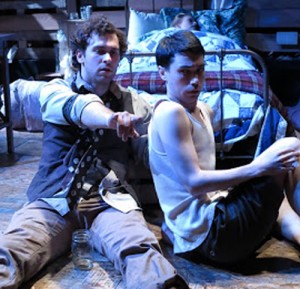The terrifically titled Alligator Summer unfortunately outshines the play it’s attached to. Playwright Dylan Lamb has subtitled the work A Southern Gothic Atrocity in Three Acts, and although director Brandi Varnell’s production doesn't follow that structure, the Southern Gothic Atrocity part is a tribute to truth in advertising.
Lamb seems to have drawn inspiration from a variety of classic Southern sources: The Glass Menagerie (there’s a young narrator like Tom, and the play is a memory from 1944), the eccentrics of James Wilcox’s novels, and A Confederacy of Dunces—which, had the title not already been taken by John Kennedy Toole, would almost have been ideal for the characters in Alligator Summer. They are practically all dim bulbs, though they’re not in confederacy. They’re at one another’s throats.
The play concerns two families whose names signal that this is a parody of sorts: Antietam Julep, Atticus Julep, Ethylann Gettysburg, Antebellum Gettysburg. Antietam (Nicholas Yenson) is the narrator, announcing that it’s a memory play, filtered through time and alcohol, and evoking Williams's masterpiece. The families are neighbors, and Ethylann Gettysburg (Jackie Krim) is having an affair with Atticus Julep (Mark A. Keeton), cuckolding her gold ol' boy husband Bundle (played with a sympathetic decency by Nathan Brisby).
As the memory begins, all the characters but one are gathered in an attic, around the bed of Attica Julep (Annalisa Loeffler), who is dying of typhus. Or perhaps not. From here they enter and exit through a window. Somewhere outside is son Toby (Dylan Lamb). Down below, one is given to believe, is a host of alligators swimming around, although it later turns out they're not swimming. When Toby returns from “his ambiguous errand”( as Bundle knowingly terms it in a meta-theatrical comment), he recalls the alligators’ arrival. “First days was rough, mind you," recalls Toby. "I’d gone to fetch this whiskey barrel…and as I’m rolling it out the back I beheld an endless army of Gators, strolling on down Main Street…” Swimming or marching, the toothy amphibians have nonetheless taken over the town of Willow Delta, and in the manner of an Ionesco play (e.g., Rhinoceros), there’s no lucid explanation of why. But it’s certainly the reason that Bundle urges Antebellum to use “inside voices…or the gators may hear you.”
If Lamb has a serious message to convey via metaphor or Kafkaesque allegory, it’s not apparent. One senses that the situation is just a springboard for an overheated parody of melodrama, and at that level it works. Still, so much campiness ought to be consistently funny, and Alligator Summer, though it has a good share of laughs, is more often laden with determined quirkiness than with hilarity.
Varnell understands that such material must be played straight by the actors, and they perform with commitment their Southern eccentrics, no matter that they're removed from discernible reality. As Toby, author Lamb shows a skilled comic dryness, and he has given himself some juicy monologues; Toby is a rake given to anti-gay bigotry and murder, but Lamb plays the florid language with just enough humor to make him the most enjoyable redneck of the bunch. “Now listen close,” Toby counsels his brother Antietam. “A boy can become a man in two ways, each as ‘ceptable as the other. He can kill a man less deserving of life than he, or make satisfying, preferably consensual love to a pretty woman.” And there’s something canny about that “than he” rather than “than him.” It’s a nice flourish of grammatical accuracy that demonstrates the author’s genuine talent for dialogue.
Yenson gives a sympathetic portrayal of the confused and struggling Antietam, who is supposedly 13. Though the actor is clearly older, he taps into a mix of sweating desperation and shame (he’s gay but not out) and admiration for his older brother that make the discrepancy irrelevant. A scene in which Toby insists that Antietam prove his heterosexuality by having sex with young (and overeager) Antebellum Gettysburg (Erin E. McGruff) employs the name of another famous Civil War battle in a manner calculated to make the Daughters of the Confederacy blench.
In spite of the performances, Varnell hasn’t found an overall tone for the piece, apart from sweaty desperation. One senses that the play is meant to be much funnier than it is, but at least it marks Lamb as a young writer with a gift for a certain kind of dialogue and a sharp sense of humor. When he breaks away from the inspirations so evident here and finds his own voice, he's likely to fulfill the promise he shows.


